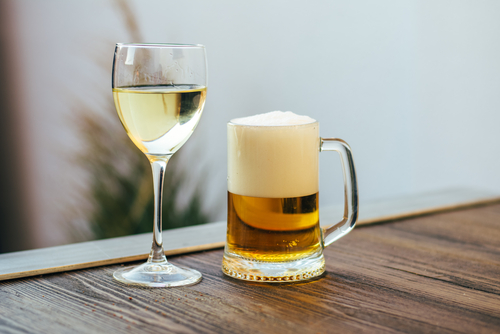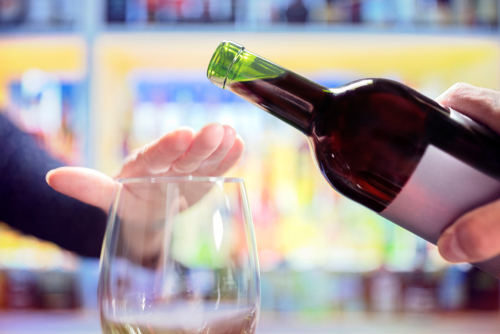If you want to know if tapering off alcohol is the best detox method to reduce or avoid withdrawal symptoms, you’re in the right place. This short article discusses everything you need to know before you decide to taper off alcohol, including tips, a typical taper schedule, and how tapering compares to quitting cold turkey or medically-assisted detox.
While tapering off alcohol is not as effective or monitored as medically-assisted detox, it’s a better solution than quitting cold turkey, which can induce serious withdrawal symptoms.
Why Tapering Off Alcohol Is Better Than Quitting Cold Turkey
Tapering off alcohol can be compared to how healthcare providers gradually reduce the dosage of certain medications rather than having a client abruptly stop treatment. Quitting alcohol cold turkey poses significant risks to your health.
Although it may initially appear that ceasing alcohol consumption immediately is the most effective or easiest way to get through it, quitting alcohol cold turkey poses significant risks to your health. The abrupt stop can shock your system and induce serious side effects due to the physical dependence from prolonged heavy drinking. With physical dependence, your body becomes accustomed to alcohol and reacts negatively when it doesn’t get any more.

What Happens If You Quit Drinking Cold Turkey?
Heavy drinking causes notable changes in the brain, specifically affecting the neurotransmitter gamma-aminobutyric acid (GABA). Over an extended period of excessive alcohol consumption, the brain reduces its production of GABA since it’s used to alcohol doing most of the work. Consequently, quitting alcohol suddenly deprives the brain of sufficient GABA levels, leading to a state of hyper-excitability and the emergence of withdrawal symptoms.
Alcohol also acts as a depressant on the central nervous system. When you abruptly stop drinking, your body struggles to rebalance itself, resulting in an excessive increase in the levels of glutamate, an excitatory substance. This surge in glutamate can trigger alcohol withdrawal symptoms, which can be potentially dangerous in certain cases.
Withdrawal symptoms typically follow a general timeline. For example:
Six to eight hours after the last drink: Following the abrupt cessation of alcohol consumption, individuals may experience mild withdrawal symptoms, including tremors, anxiety, and nausea.
12 to 24 hours after the last drink: Within this timeframe, hallucinations may commence, accompanied by other symptoms such as tremors, agitation, and insomnia.
12 to 48 hours after the last drink: The severity of withdrawal symptoms may escalate during this period, and there is a risk of experiencing seizures.
Two to five days after the last drink: Delirium tremens is the most dangerous complication of alcohol withdrawal. Symptoms include unstable vital signs, confusion, agitation, fever, rapid heart rate, high blood pressure, and excessive sweating.
One to six months after the last drink: Most withdrawal symptoms tend to improve as sobriety is maintained. However, individuals may still experience lingering anxiety and sleep problems. But, those can be treated or managed with further sober aftercare plans.
Tips For Tapering Off Alcohol
By gradually decreasing your alcohol consumption over time rather than abruptly ceasing it, you allow your brain to adjust its production of GABA and glutamate. Here are two tips or ways you can taper off alcohol.
Direct taper: In a direct tapering approach, you maintain your usual drink but gradually reduce the quantity consumed over time. This method is most effective when applied to beverages with a low alcohol percentage, such as beer and alcoholic seltzers.
Substitution taper: During a substitution taper, you replace your typical alcoholic beverage with a different one. For instance, if you typically consume strong liquor, a substitution taper involves calculating your daily drink count and transitioning to an alternative with a lower alcohol content, such as beer. Gradually reducing the quantity of beer consumed over time is an integral part of this tapering method.
A substitution taper using beer can offer several advantages:
- Monitoring and measuring your beer intake is easier than spirits.
- Binge drinking is typically more challenging with beer than with spirits.
- Due to its higher water content, beer facilitates better hydration, making it easier to stay hydrated.
- When implementing a substitution taper, transitioning to smaller amounts of alcohol can be more manageable, allowing your body to adapt more easily.
Read more: Does Your Body Detox From Drugs When You Start Eating Healthy?

How Long Should Tapering Off Alcohol Take?
The duration of alcohol tapering depends on how much alcohol a person typically drinks. If someone consumes larger quantities of alcohol, they will generally need a longer tapering period compared to someone who drinks less.
Another important factor affecting the tapering duration is the presence of alcohol withdrawal symptoms. The main goal of tapering is to prevent or minimize withdrawal symptoms. If withdrawal symptoms appear during the tapering process, the taper may be happening too quickly and must be slowed down. Slowing down the tapering pace can help manage withdrawal symptoms effectively.
Read more: How Many Days Does It Take To Detox from Alcohol?
A Typical Alcohol Tapering Schedule
A recommended taper schedule involves determining the daily number of drinks consumed. Once calculated, a tapering plan can be established where the initial day involves consuming the usual amount, followed by gradual reductions each subsequent day. Here’s what a sample taper schedule looks like:
Day one: 6 drinks
Day two: 5 drinks
Day three: 4 drinks
Day four: 3 drinks
Day five: 2 drinks
Day six: 1 drink
Day seven: No drinks
It is crucial to ensure that each day’s drink count is lower than the previous day to maintain a gradual reduction. It’s also important to avoid getting stuck at a particular step, as it would defeat the purpose of the taper. Individuals can adjust the taper speed according to their preference, such as reducing the drink count by three instead of two if desired.

Tapering Off Alcohol Vs. Medically-Assisted Detox
Even though tapering off alcohol can help reduce withdrawal symptoms, it’s not a perfect detox method. For individuals with severe alcohol addictions, seeking professional help is strongly recommended. The complex nature of severe alcohol dependence requires specialized care and expertise that healthcare professionals can provide. Attempting to taper off alcohol without professional guidance may pose significant health risks and may not effectively address the underlying addiction issues.
Here’s why medically-assisted detox is the most effective detox method:
Supervision: Medically-assisted detox provides a controlled and supervised environment for individuals undergoing alcohol withdrawal. This supervision level ensures medical stability and helps clients stick to their detox.
Medications: Medically-assisted detox involves the administration of specific medications to alleviate withdrawal symptoms and minimize discomfort. Medications like benzodiazepines or anti-seizure drugs may be prescribed, helping to stabilize brain activity and prevent potentially life-threatening complications like seizures or delirium tremens.
Complete Support: Professional detox programs offer comprehensive support services beyond medication management. These may include counseling, therapy, nutritional guidance, and access to support groups. This holistic approach addresses the physical aspects of addiction and the underlying psychological and emotional factors contributing to alcohol dependence.
Contact MD Home Detox
If you or someone you know has an alcohol use disorder and struggles to reduce their alcohol intake, contact MD Home Detox. Our at-home alcohol detox plans allow you to safely overcome substance use and avoid the intense and potentially fatal effects of alcohol withdrawal symptoms. If you want to know about our medically-assisted detox program, call today, and one of our admissions agents can help you get started.

